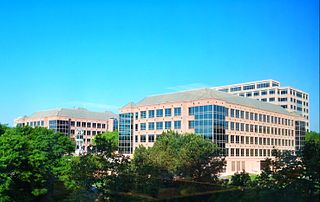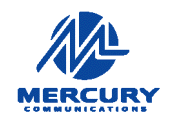Country Code: +1284
International Call Prefix: 011
Telecommunications in Trinidad and Tobago include radio, television, fixed and mobile telephones, and the Internet.
Communications in Barbados refers to the telephony, internet, postal, radio, and television systems of Barbados. Barbados has long been an informational and communications centre in the Caribbean region. Electricity coverage throughout Barbados is good and reliable. Usage is high and provided by a service monopoly, Barbados Light & Power Company Ltd..

AT&T Mobility LLC, also known as AT&T Wireless and marketed as simply AT&T, is an American telecommunications company. It is a wholly owned subsidiary of AT&T Inc. and provides wireless services in the United States, excluding Puerto Rico and the U.S. Virgin Islands. AT&T Mobility is the largest wireless carrier in the United States, with 176.7 million subscribers as of the end of Q3 2020.
AT&T Wireless Services, founded in 1987 as McCaw Cellular Communications, formerly part of AT&T Corp., was a wireless telephone carrier in the United States, based in Redmond, Washington, and later traded on the New York Stock Exchange under the stock symbol "AWE", as a separate entity from its former parent.
O2 (typeset as O2) is a global brand name owned by the Spanish telecommunications company Telefónica. The company uses the O2 brand for its subsidiaries in the United Kingdom and Germany. Since 2018, it is also used as a secondary brand in Spain.

BT Communications (Ireland) Limited is a telecommunications and internet company in Ireland. It is a subsidiary of BT Group plc.

Mercury Communications was a national telephone company in the United Kingdom, formed in 1981 as a subsidiary of Cable & Wireless, to challenge the then-monopoly of British Telecom (BT). Although it proved only moderately successful at challenging BT's dominance, it led the way for new communication companies to attempt the same.
Digicel is a Caribbean mobile phone network and home entertainment provider operating in 33 markets across the Caribbean, Central America, and Oceania regions. The company is owned by Irish businessman Denis O'Brien, is incorporated in Bermuda, and is headquartered in Jamaica.

Arima, officially The Royal Chartered Borough of Arima is the easternmost and second largest in area of the three boroughs of Trinidad and Tobago. It is geographically adjacent to Sangre Grande and Arouca at the south central foothills of the Northern Range. To the south is the Caroni–Arena Dam. Coterminous with Town of Arima since 1888, the borough of Arima is the fourth-largest municipality in population in the country. The census estimated it had 33,606 residents in 2011.

Telecommunications Services of Trinidad and Tobago Limited is a large telephone and Internet service provider in Trinidad and Tobago. The company, which is jointly owned by the Government of Trinidad and Tobago and Cable & Wireless Communications, was formed out of a merger of Telco and Textel. TSTT no longer holds a monopoly in fixed-line telephone services due to FLOW introducing a fixed-line service of their own, and their cellular monopoly was broken in June 2005 when licenses were granted to Digicel and Laqtel.
Sunbeach Communications Inc. is an Internet Service Provider, Internet web hosting provider and mobile/wireless phone company located in Barbados. Since the mid-1990s Sunbeach is one of the chief competitors to the incumbent telecommunications company Cable and Wireless in providing Internet. Sunbeach was badly affected by the financial crisis of 2008 leading to halted VC investments and the inevitable link disconnection on 23 March 2013. The Sunbeach website remains in a temporary state and offers no new products or further information. Customers found themselves without Internet and no official communication from the company on the morning of 24 March 2013. No statement has been received from the company since the disconnection until date (Q2-2016).
A spectrum auction is a process whereby a government uses an auction system to sell the rights to transmit signals over specific bands of the electromagnetic spectrum and to assign scarce spectrum resources. Depending on the specific auction format used, a spectrum auction can last from a single day to several months from the opening bid to the final winning bid. With a well-designed auction, resources are allocated efficiently to the parties that value them the most, the government securing revenue in the process. Spectrum auctions are a step toward market-based spectrum management and privatization of public airwaves, and are a way for governments to allocate scarce resources.
Television in Trinidad and Tobago was introduced in 1962 beginning with Trinidad & Tobago Television. TTT was the sole television station for 29 years being operated by the state until the first independently operated television station, the Caribbean Communications Network, CCN TV6 was launched in 1991 breaking the television monopoly market. In 1992, a second independently operated station, AVM Television was launched. The first independently operated cable station, The Trinity Network (TTN) now Trinity TV began operations in 1993 broadcasting on weekends only.
The United States 700 MHz FCC wireless spectrum auction, officially known as Auction 73, was started by the Federal Communications Commission (FCC) on January 24, 2008 for the rights to operate the 700 MHz radio frequency band in the United States. The details of process were the subject of debate among several telecommunications companies, including Verizon Wireless, AT&T Mobility, as well as the Internet company Google. Much of the debate swirled around the open access requirements set down by the Second Report and Order released by the FCC determining the process and rules for the auction. All bidding was required by law to commence by January 28.

bmobile is a Mobile Phone, IPTV, Home Security provider, and ISP of Trinidad and Tobago, operating as a division of TSTT.
LIME, an acronym for 'Landline, Internet, Mobile, Entertainment', was a communications provider owned by the British based Cable & Wireless Communications for its operations in Anguilla, Antigua & Barbuda, Barbados, British Virgin Islands, Cayman Islands, Dominica, Grenada, Jamaica, Montserrat, St. Kitts & Nevis, St. Lucia, St. Vincent & the Grenadines and Turks & Caicos in the Caribbean.
3G mobile telephony was relatively slow to be adopted globally. In some instances, 3G networks do not use the same radio frequencies as 2G so mobile operators must build entirely new networks and license entirely new frequencies, especially so to achieve high data transmission rates. Other delays were due to the expenses of upgrading transmission hardware, especially for UMTS, whose deployment required the replacement of most broadcast towers. Due to these issues and difficulties with deployment, many carriers were not able to or delayed acquisition of these updated capabilities.
Flow is one of many trade names of the Caribbean former telecom Cable & Wireless Communications (CWC), now Liberty Latin America used to market cable television, internet, telephone, and wireless services provided by the company. Flow operates services in Barbados, Jamaica, the Cayman Islands, St. Kitts and Nevis, Trinidad and Tobago, Montserrat, Dominica, Antigua & Barbuda, St. Vincent, St. Lucia, Grenada, Anguilla, Curaçao, the Turks and Caicos Islands and the British Virgin Islands.






